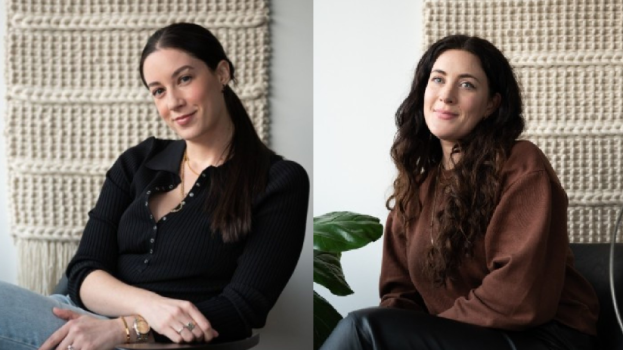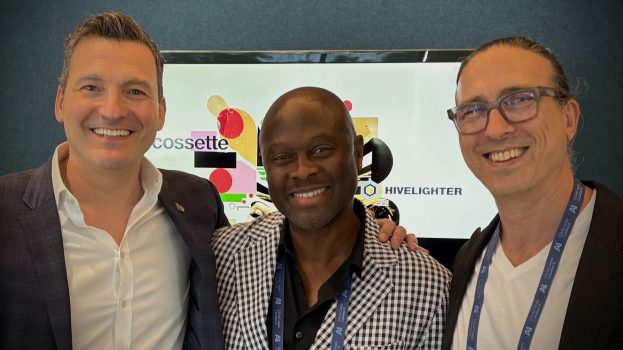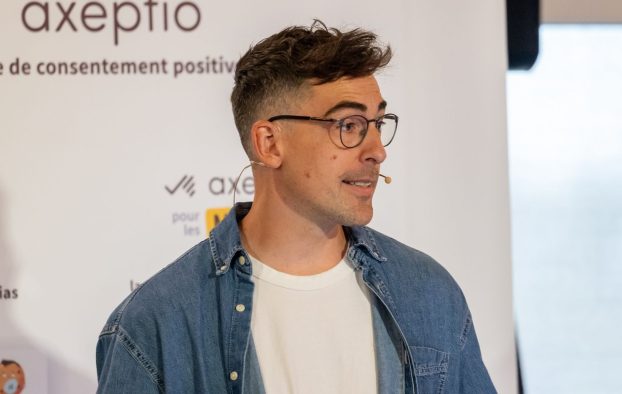Chris Bergeron is VP of content experience at Cossette in Montreal, having joined the agency five years ago as a creative director.
Four years ago, she began gender affirming hormone treatments.
“Before that, I had a bit of a David Bowie thing going on,” she says. “It took me a long time to actually come out, and a bit after that until I started on hormones.”
Begeron has given a presentation several times in different Cossette offices called “Losing My Privilege,” where she discusses how her transition away from being a straight male leader impacted her perspective on the workplace and how to be a leader for every person who walks through the agency’s doors.
“There’s this notion in feminism and queer culture of intersectionality, how the struggle of one is tied to the struggle of the other, who is under the pressure of the same power structures,” she says, reflecting on a big message of the presentation. “I’m seeing more solidarity between groups. It’s important that each group fight for the causes and idiosyncrasies of each group, because each one has their own issues that are very specific to them, but there is also solidarity between everyone who has a fight.”
Bergeron recently spoke to strategy about the reaction to her talk, the lessons she tries to communicate during it and what her broader experiences in the industry say about the next steps it needs to be taking.
What can someone do to be more empathetic to co-workers who are trans or queer?
If I was to use a pop culture example, in the ’90s, you had Transamerica with Felicity Huffman, where a cis woman was playing a trans woman. Fast forward 20 years, and we have Pose or Orange is the New Black, with trans women playing trans women. Advertising and most other industries are in the Felicity Huffman phase. There’s a lot of beautiful campaigns, some of them by Canadian agencies, about trans issues and queer rights. But then you look at who is doing them, and it’s a lot of straight people. It’s wonderful, because it shows ally-ship, but the next step is queer people doing campaigns for queer people. Maybe that sounds self-serving, but it’s important that our voice on that specific issue is heard.
If you have a table surrounded by a typical creative department with beards and hats and tattoos on one arm and mostly white, and you work with a queer person, they might be shy, not because you’re mean, but because there are so many of you. So take the time to listen and include them. And it does require extra effort. It’s not about being nice, being nice is not enough. It’s about doing something. You have to go out of your way. My bosses [Cossette president and CEO] Melanie Dunn and [chief strategy officer] Florence Girod have done that for me, and it’s helped me be very good at my job.
And how can they also reflect that inclusion in their work?
Queer-washing is really a thing, 2019 has been the year of queer-washing. All the companies that change their logos to rainbows, even if they give money to anti-queer politicians or organizations. The next step is having creatives that think about that reality, and not just trans realities, year-long. Don’t just do something for Black History Month or Pride or whatever is on a calendar of causes. It is something you live day-to-day.
A lot of creatives come to me, and they did the rainbow thing, and they are very proud because they think they did the right thing. And it kinda sucks to tell them, well, that’s the basic level. Where do you go from here, what stories are you going to tell. That’s going to be the lesson next year and beyond, stop looking for the design quick-fix. To be honest, I’ve approved campaigns that do that, and done it recently, because I don’t want people to think we’re hard to work with. So I have to tell them to build on that, do it in an original way and tell stories about queer inclusiveness.
Diversity and inclusion are inescapable topics in this industry, but do you think the actions have really backed up the talk?
It’s fairly easy to sit around and talk. Because we’re communicators, we are actually fairly aware of what is happening in society, which is why it comes up so much. But are we good doers when it comes to how we set up our companies? I don’t think we’re as great at actually setting up structures within agencies that can help people of different minorities thrive. I say, “yes to special treatment, but no to reduced positions.” I received “special treatment,” in the sense that going through hormones is a rough ride sometimes, and I got some leniency where I could take a day off because I can’t stop throwing up, or need to take months off. And it was fine and didn’t affect my career because they knew I could still deliver. Everyone, regardless of who you are, needs a support system to deliver at work, and I have mine and it motivates me to give more. Not because they talk about diversity or some CEO says that we are a diverse company.
I’ve had clients call and ask that I be fired. I used to work at a different agency, before I started on hormones but after I was beginning to identify as a woman. I remember being called by HR to tell me to stop going to the women’s washroom until I started hormones. That’s all quite harsh, and I started getting depressed and stopped delivering at work, and eventually I was let go. I don’t think that company would do that today. I think they were trying to be progressive, they thought they were trying to protect their other employees. But what has evolved in the business world is that more people like me are speaking out and delivering the user manuals, telling our companies what kind of support systems we actually need.
Does it ever feel like you have a pressure on you to represent your community in this industry?
Much more in day-to-day life, when I’m walking down the street. Luckily, because Cossette is a renowned agency, the fact that I work there gives me a seal of approval. I have the legitimacy to show up in a boardroom with VPs and CEOs and have a voice. That would be more difficult to do if I was a freelancer, for instance. I am safer because I’m part of a structure, and that gives me strength. But every time I meet a new client, every time I’m in a more conservative or formal setting, or if I give a presentation on something like content strategy, the first couple of minutes, people are going to look at me and think “What the hell is that?” Some people are not going to get over that, but eventually, they are going to listen to what I have to say. The burden is also one of salesmanship, in a sense. I have to convince everyone, all the time, that I am competent.
Just because someone is queer or different, you don’t want them to turn into a flag bearer, the one person proof that is supposed to carry diversity as a concept within an entire company. I find often, companies try to make it about them. It’s not about you. It’s about your employee and their story.
You have talked a lot about the things your transition has taught you. What is the one biggest lesson?
Empathy. I listen more than I ever did to my teams, because I’ve been listened to, and I listen more to my clients as well. I like to say that being trans can be likened to a walking billboard, because every time you meet someone new it’s like coming out, so I know what it’s like to have to communicate your reality to someone. And maybe I have a more concrete understanding of what it’s like to be a client, because they do that as brands, sending their message every time a consumer interacts with them. I was walking down the street and I ran into someone from an agency I used to work at, and she said she remembered that as a man, I was very to the point, “This is bullshit, do this again.” After the transition, she said I listen more and it seemed like I cared a bit more about what the person in front of me had to say, instead of judging first.
What are the next steps that need to be taken?
The thing is, as a trans woman, I don’t know what the future looks like for somebody like me. I’m in my 40s, and I don’t know what it looks like to be a trans advertising professional in her 50s or 60s. I don’t know what the blueprint looks like for someone like me. And outside of work, the freedom I have today is contingent on the fact that we’ve had governments be supportive of trans rights, but what if we get more conservative in the years to come? Is it going to be like in the U.S. where trans rights are in question?
That’s the fight, winning in the present while trying to open avenues to a future that isn’t scary. If tomorrow, things get more difficult because of a climate crisis or there’s a political shift or a recession, people in minority groups are always the first ones to suffer. We have to build solidarity, be vocal and do everything we can while we are in a good place in terms of our rights, we have to take advantage of that and maximize our place in society as much as we can. That’s why now is the time to do it, because we have a government that is pro-trans, so that means we are safer and our rights are secured, but we are also afraid of losing that because of Trump-like thinking, which gives us the urgency to not sit on our asses.
This interview has been edited for length and clarity.























